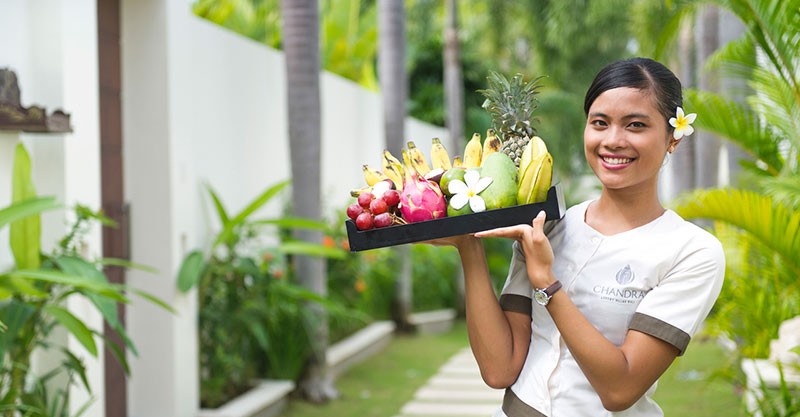The Role of Balinese Women in Sustainable Tourism Development: Bridging the Gender Gap

Budi Shantika
Tourism Lecture at Universitas Pendidikan Nasional
In Indonesia, the labour market is distinctly divided into primary and secondary sectors, with women making notable strides in education and employment. However, they continue to lag behind men in terms of representation and influence, particularly in the tourism sector. The challenges faced by women in this industry are deeply rooted in social norms, cultural traditions, and institutional barriers that limit their access to leadership roles and decision-making positions.
 In Bali, the strong patriarchal culture further exacerbates gender disparities, often resulting in the exclusion of women from key decision-making roles in tourism development. Traditional beliefs dictate that men should assume leadership roles in business and governance, while women are expected to focus on domestic responsibilities and informal labor. This cultural dynamic not only limits women’s economic mobility but also restricts their ability to influence policies that impact their livelihoods and communities. Despite these barriers, Balinese women play an essential role in sustaining the local economy through their contributions to the tourism sector. They are heavily involved in maintaining traditional culinary practices, crafting handmade souvenirs, performing Balinese dances, and managing homestays that offer authentic cultural experiences to tourists. These roles, while vital, are often undervalued and do not translate into positions of authority within the industry.
In Bali, the strong patriarchal culture further exacerbates gender disparities, often resulting in the exclusion of women from key decision-making roles in tourism development. Traditional beliefs dictate that men should assume leadership roles in business and governance, while women are expected to focus on domestic responsibilities and informal labor. This cultural dynamic not only limits women’s economic mobility but also restricts their ability to influence policies that impact their livelihoods and communities. Despite these barriers, Balinese women play an essential role in sustaining the local economy through their contributions to the tourism sector. They are heavily involved in maintaining traditional culinary practices, crafting handmade souvenirs, performing Balinese dances, and managing homestays that offer authentic cultural experiences to tourists. These roles, while vital, are often undervalued and do not translate into positions of authority within the industry.

Moreover, many women engage in tourism out of economic necessity rather than career aspirations. With limited access to formal employment opportunities, women frequently participate in small-scale entrepreneurial ventures such as running warungs (local eateries), selling traditional textiles, or offering guided cultural tours. While these activities provide financial support for their families, they rarely lead to upward mobility or greater influence in the broader tourism sector. The contributions of women to cultural and environmental preservation are equally significant. Through community-based initiatives, women play a central role in maintaining traditional Balinese rituals, temple ceremonies, and sustainable farming practices that align with the island’s Tri Hita Karana philosophy, which emphasizes harmony between humans, nature, and the divine. Their efforts not only sustain local customs but also enhance Bali’s appeal as a premier cultural tourism destination. However, these contributions are often overshadowed by male-dominated decision-making structures in government and business sectors.
A critical gap identified is the lack of representation of women in the planning and development of tourism strategies. Despite their integral role in the industry, women’s perspectives are frequently overlooked when policies are formulated. This exclusion perpetuates gender inequalities and prevents the tourism sector from fully benefiting from the insights and expertise that women bring to the table. To foster sustainable tourism practices and ensure equitable representation, it is imperative to amplify women’s involvement in tourism development. This can be achieved by creating platforms that encourage women’s participation in decision-making processes, providing leadership training programs, and recognizing their contributions through policy reforms that promote gender inclusivity. Government agencies, tourism stakeholders, and local communities must work together to dismantle structural barriers and support women in achieving greater economic and professional autonomy. Initiatives such as microfinance programs, business development workshops, and mentorship networks can help women entrepreneurs expand their tourism-related ventures and gain financial independence. Encouraging collaboration between male and female tourism professionals can also help shift societal attitudes towards a more inclusive and equitable industry.
While progress has been made in recognizing the role of women in Bali’s tourism sector, significant gender disparities persist. Addressing these disparities is essential not only for the empowerment of women but also for the sustainable development of tourism in Bali. By bridging the gender gap and ensuring that women have a voice in shaping the future of tourism, we can create a more inclusive, resilient, and sustainable industry that respects and preserves the island’s unique cultural and environmental heritage.

Budi Shantika
Tourism Lecture at Universitas Pendidikan Nasional

